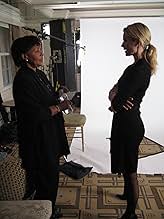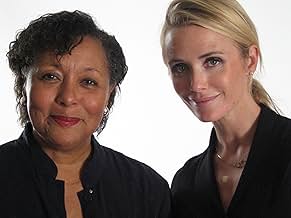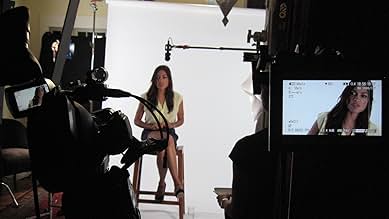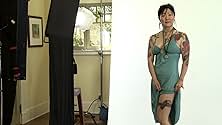Explores the under-representation of women in positions of power and influence in America, and challenges the media's limited portrayal of what it means to be a powerful woman.Explores the under-representation of women in positions of power and influence in America, and challenges the media's limited portrayal of what it means to be a powerful woman.Explores the under-representation of women in positions of power and influence in America, and challenges the media's limited portrayal of what it means to be a powerful woman.
- Awards
- 1 win & 1 nomination total
- Self - Associate Professor of Political Science, Occidental College
- (as Caroline Heldman Ph.D.)
Featured reviews
Basically this documentary tries to build the case that media is an insidious influence, whenever it is convenient to their case, but ignores any evidence that doesn't fit their theory. For instance if media were so influential, Americans would be thin and fit, but we all know that isn't true. But more to the point the issue with this documentary is that it is not concerned with looking at its arguments in any depth, instead a cheap slogan type of declaration or testimony is put out by some talking head and in a few minutes of selective media clips they try to cover the lack of depth by jumping from topic to topic flooding you with a barrage of clips and speakers. It reminds me more of a political campaign advertisement than a serious documentary really interested in honest examination of an issue.
They make points claiming that other countries have had women leaders before us because we don't depict them in the media, but does that even pass quick inspection? Benazir Bhuto who was a female prime minister of Pakistan lead arguably one of the most sexist countries on earth. So how does that argument even pass muster before they put it in the documentary? It epitomizes the level of thinking in this film.
Margaret Cho for example claims that sexism was the reason her sitcom failed, but is that really true? Maybe she just isn't funny. It doesn't matter to this film because all they do is throw these statements out there one after another. Statements claiming that shows like jersey shore are sexist because they show women in a bad light are made entirely ignoring the fact that the male cast in those shows are hardly considered respectable either. This type of poorly thought out argument is the basis for the entire film sadly, and because it is so paper thin, they cut from topic to topic in a hyperactive manner.
TV networks like FX have even been known to do things like pass on hit shows like Breaking Bad because they rejected the show based on their quest to break into the lucrative female demographic. Apparently the middle aged white lead was enough for them to pass on the show. But such facts do not matter to this film, which assumes sexism is always the answer to every question in the most simplistic way.
My problem with films like these is that they are more about employing techniques of propaganda with selective evidence and shallow one sided argument rather than encouraging critical thought about a subject. To promote this as a feminist film is really to give women no credit at all.
If one is going to claim that media does women a disservice, I would suggest this film is the most harmful of all. To use the words of Erika Falk PhD from the documentary against herself and the film itself, women like her and this film paint themselves as "more fragile, emotional, and more gullible than men, therefore they are irrational and cannot be trusted in positions of power".
But if we philosophically talk about this film and its contents, it's OK, it talks about real and horrible problem of teenage depression, diet obsession and disorders and many other maladies caused by living in a bubble created by media. People of both genders have this disorder and have obsessions with their bodies and look. It's planetary. Maybe even anthropological question since since ever people maimed their bodies to look 'great', from European corsets in the mid-XX century, Chinese wooden shoes, collars that extend necks of African tribal women, to contemporary plastic surgery.
I think that problem lies in fashion in general, in human obsession with fashion. In human need to be accepted. Actually the problem is very deep. Focusing on solely media is only a tip of the iceberg.
Miss Representation's goal is to inform people about the blatant sexism in Television, advertising, society, politics, and film. It does a very nice job at providing each of their subjects with material and substance, also giving them enough time to get their point across. I believe more than eight minutes is devoted to the political aspect, and several more to Television and film. For an eighty-eight minute documentary, it covers a lot of heavy territory, and even, gasp, includes efficient solutions during the end credits.
The interviewees are Geena Davis, Condoleezza Rice, Lisa Ling, Nancy Pelosi, Katie Couric, Rosario Dawson, Jim Steyer, Dr. Jackson Katz, and Gloria Steinem, who all comment on the media's insidiously harmful portrayal of women. Comments are made on how advertising has evolved from genial snippets into racy, sexploitation spots begging to be noticed and controversial. It has been proved in the field of advertising that sex sells, and companies race their commercials and magazine advertisements to an invisible finish line to see who can be more daring and provocative.
But what are the consequences for imposing such demeaning pictures of women? For one, there's the obligatory "striving for unsustainable beauty" argument. I don't think there is one person who believes that what they see on the front cover on a tabloid or a magazine has not been digitally altered or photoshopped in some way, shape, or form. Most likely, all three of those things have been changed on a picture of a woman, and it's not hard to find out. How many women do you know have pearly white skin and don't occupy a single blemish, mole, pimple, or scar? I remember on KISS FM's "DreX in the Morning" radio program they discussed how parental browbeating and mediocre, sometimes abusive relationships affect a woman's already fragile self-esteem and worth. They brought up how on a magazine cover, Brittney Spears' face was photoshopped onto the body she occupied in the nineties.
Miss Representation doesn't break new ground or uncover anything that wasn't pretty much known before, but will likely be useful to teenage girls who are perhaps unaware of the media bias. I unfortunately missed a screening of this at my high school and a lengthy lecture following it. It would've been nice to see audiences reactions in the flesh. I can see some dismissing this as mock-feminist propaganda and I can see people being truly informed and moved by this documentary. Me, I stand where I usually am; in the middle. This is a well made documentary, but not without my personal quibbles and questions. For one, the film mentions that there are very few women directors, screenwriters, cinematographers, etc. Okay, but are women being forced out by the big, bad man, or are they just not showing a genuine interest in the behind the scenes aspects of the film industry? Another thing I must bring up; maybe it's not the studios' fault that women are portrayed so dimly in film. You can't tell me that actresses like Megan Fox and Jessica Simpson don't contract themselves to basically flaunt their stuff in films like The Dukes of Hazzard and Transformers. They know what they're getting into, and appear to have no problem showing what they have. I'm not saying it's right, but maybe the film is too quick to point figures at the provider rather than the person signing the contract and giving consent to be used as a basic caricature.
Director Jennifer Siebel Newsom has done a bold and admirable thing releasing Miss Representation, not only letting it glide its way around the country in screenings, but by giving the distribution rights to The Oprah Winfrey Network. This is an informative and amusing documentary showing us that our biggest source of information also serves as our biggest influence on people, good and bad. I'll leave off with a quote from Jim Steyer, one of my favorite speakers in the film; "It's not a Liberal or Conservative issue; it's an American issue and an American problem." Starring: Geena Davis, Condoleezza Rice, Lisa Ling, Nancy Pelosi, Katie Couric, Rosario Dawson, Jim Steyer, Dr. Jackson Katz, and Gloria Steinem. Directed by: Jennifer Siebel Newsom.
The film is filled with much of what we studied in graduate school in the early 90s. So I guess there was a lot of "no duh" moments for me in it. But if it opens some people's eyes then it's worth it. The messages are essential to the health of our daughters, sons and country as a whole. Many of what I thought were the most important parts of the film were "glossed over," but that may be my view/perspective. For example, to me THE MOST important point in the film is that TV shows are essentially "made for men 18-34." Why - because that demographic doesn't really watch TV unless they're driven to the set somehow. TV show creators don't worry about women - because women watch TV anyway.
Think about that - most of us can agree that most of what's on TV is crap. And yet, the people who make TV don't worry about losing the female audience at all. Until women turn off the crap on TV, I doubt that will change.
Hit or miss (no pun intended) outing for a first time director. Great messages, important content, mediocre execution. Probably too much "sexual imagery" for me to let my 12 year old daughter watch it - but soon. And everyone over 15 should be aware of the subject matter. This is as good a way as any.
Eventually, the documentary settles into the material, and it makes a solid argument. The shocking double standard of judging (and prizing) women differently than men in the media, the teenagers who work overtime to fit a media ideal. It's an engaging piece.
This is worth it if you can get beyond the clumsy opening. I have a child of my own, and I can empathize with Newsom in worrying about the world in which she'll grow up. It's just that the motherhood aspect was shoe-horned into the documentary.
6/10
Did you know
- Quotes
Herself - Associate Professor of Political Science, Occidental College: Women who are high self-objectifiers have lower political efficacy. Political efficacy is the idea that your voice matters in politics and that you can bring about change in politics. So if we have a whole generation of young people being raised where women's objectification is just par for the course, it's normal, it's okay, we have a whole generation of women who are less likely to run for office and less likely to vote.
- ConnectionsFeatures Liliane (1933)
- SoundtracksHelp, I'm Alive
Written by Emily Haines and James Shaw
Performed by Metric
Courtesy of Metric Music International
- How long is Miss Representation?Powered by Alexa
Details
- Release date
- Country of origin
- Official site
- Language
- Also known as
- Miss Escaparate
- Filming locations
- Production companies
- See more company credits at IMDbPro
Box office
- Budget
- $750,000 (estimated)
- Runtime
- 1h 25m(85 min)
- Color








































